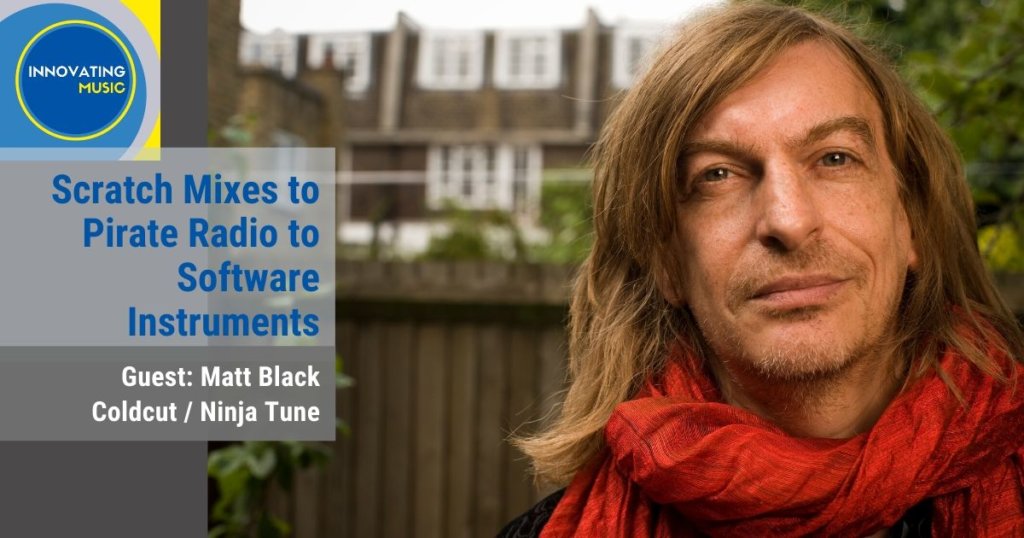 |
 |
 |
 |
Innovating Music Podcast
Listen to innovators, change agents, entrepreneurs, creators, and researchers who all are making big leaps, nudging change, creating differently, or watching what is happening from a unique POV. Dr. Gigi Johnson from the UCLA Herb Alpert School of Music explores with our guests how tech is transforming how we create, collaborate, and create communities around music in a connected age — in our home towns and in communities across the globe.
This Episode
Matt Black has been intrigued by computers since reading “The Shockwave Rider” from a bookmobile in his small English village of his youth. Since then, he has created scratch mixes from a set of decks across London warehouse parties in the late 1980s, pirate radio, become the band Coldcut, created major hits, launched the label Ninja Tune, and developed mad programming skills. He builds what he calls “software instruments” for the iPad and (when he can) Android, expanding this year from Ninja Jam to JammPro, letting artists make their own tracks.
Photo: Oz Owen
Guest: Matt Black, Co-Founder, Ninja Tune; Member of the band Coldcut
Matt Black is half of legendary DJ duo and multimedia pop group Coldcut, formed in 1987, and founders of Ninja Tune, the UK label. In 2020, Ninja Tune celebrates 30 years as one of the world’s leading electronic music labels and a beacon for the independent music spirit. In 2017 Coldcut celebrated 30 years in electronic music with a string of gigs releases and special projects. A new album is coming in 2020.
For over 28 years as part of Coldcut he has combined cutting edge artistic expression with positive activist themes in such pieces as Journeys by DJ, The Only Way is Up, People Hold On, Stop This Crazy Thing, Timber, Panopticon, Re:volution, Energy Union, Walk a Mile, True Skool, and many more. Coldcut have worked with a wild range of artists, activists and other groups and luminaries eg Steve Reich, James Brown, Mark E Smith, Queen Latifah, Jello Biafra, Saul Williams, Robert Owens, Lisa Stansfield, Crass, Roots Manuva, Lee Scratch Perry, the BBC Radiophonic Workshop, Greenpeace, and Avaaz.
In 2011 Matt designed the iOS app Ninja Jamm, Ninjatune’s first music app which has had over 600,000 downloads; in 2020 the new advanced version Jamm Pro has been released. In 2017 2 more apps he designed were released: Pixi a visual synth, and Robbery a satirical video game. Midivolve, a music software collaboration with Ableton was released July 2017. The Zen Delay hardware unit released 2019 was also his co-creation.
At Splice festival 2017 Matt showcased his experiments with Style Transfer, a cutting edge new style of visual processing using AI techniques. For his AV show, done in conjunction with his wife filmmaker Dinaz Stafford, Jamm triggers visual clips so every sound has a matching visual. Matt collaborated with artist Wolfgang Buttress (the Hive, Kew) for BEAM AV installation Glastonbury 2019.
Links:
- Jamm Pro Website: http://jammpro.net/
- Jamm Pro for iPhone: https://apps.apple.com/app/id1148499320
- Jamm Pro Competition – Win £1000: http://jammpro.net/jp1000/
- Twitter: @NinjaJamm
- Coldcut Twitter: @Coldcut
- The Shockwave Rider, John Brunner, 1975
- The Selfish Gene, Richard Dawkins, 1940
- Tonto synth and Malcolm Cecil
- Ableton Link
- Kevin Kelly, The Next 5,000 Days on the Web, 2007, TED
- Roger Hallam, Common Sense for the 21st Century; Extinction Rebellion
Permalink to this podcast episode
Subscribe to our Podcast in Apple Podcasts, iHeartRadio, Spotify, Pandora, Overcast, Stitcher, TuneIn, Google Play, YouTube, and other favorite podcast players.
Favorite Moments
[14.02] “And then they were saying, look, just crank the handle and pull out some more records like this. make some more hits. And John and I really, in a way, we just didn’t know how to do that because we just done it from love and wanting to do something new. And we had other sounds, which we wanted to do, and other experiments we wanted to do. So, long story short, we started Ninja Tune as escape route so that we could get our identity back and keep releasing music.”
[22:26]: “You know, a large part of my motivation was to make an instrument that I could actually use because I can’t play drums or bass or let alone piano. I’m a, I’m a sort of hacker of sound who got lucky and I wanted something that was flexible and, and more powerful than turntables.”
[29:06] “I sometimes think that the, the situation we’re in is pretty exciting. It’s like the human race as a, as an organism, has had a huge upgrade to our nervous system, and we’re still at the early stages of learning how to use that. That the internet and communications technology genuinely amounts to an upgrade of our joint nervous system of connectivity. And so that’s pretty exciting. And perhaps the reason why we’re, you know, flopping around a bit like a baby, trying to learn how to coordinate itself. We won’t have full mastery for a while yet, but perhaps it will be leading somewhere good.”


